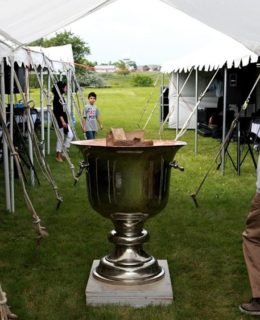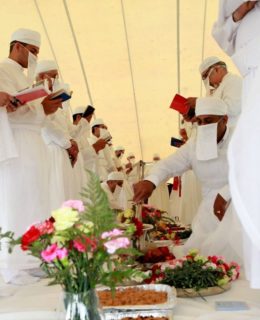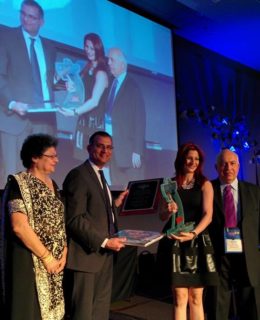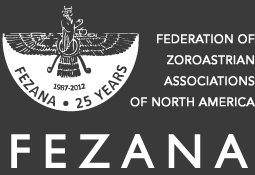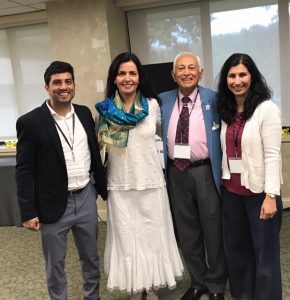 [Earlier this month, FEZANA was invited to attend the Religions for Peace North American Consultation (retreat) in Maryland. Spenta Cama, Sousan Abadian, Zamyad Meherji, and Homi D Gandhi attended this one day event. Below are reflections of the experience from Ms. Spenta Cama]
[Earlier this month, FEZANA was invited to attend the Religions for Peace North American Consultation (retreat) in Maryland. Spenta Cama, Sousan Abadian, Zamyad Meherji, and Homi D Gandhi attended this one day event. Below are reflections of the experience from Ms. Spenta Cama]
What does it look like to put your religion and faith into action and apply it to worldwide problems in order to advance society’s well-being? That was my task as an attendee representing the Zoroastrian faith at the recent Religions for Peace North American Consultation: Advancing Shared Well Being. It was no small feat for a day’s work and, spoiler alert, while we did not solve the world’s problems, we did identify issues and programs that can provide helpful solutions. The main themes of the conference included promoting a multi-religious view of positive peace, preventing and transforming violent conflicts, promoting just and harmonious societies, promoting integral human development and protecting the earth.
The conference was held at the Bon Secours Retreat & Conference Center in Marriottsville, Marylan d, a serene retreat center situated on 300 acres of property. The setting included a reflecting pond (complete with koi fish), a labyrinth and peace garden: prime grounds for the peaceful contemplation and inward reflection necessary to tackle the issues ahead of us. Brothers and sisters from the interfaith community joining us included Muslims, Catholics, Christians, Jains, Greek Orthodox, Sikhs, Hindus, Mormons and Episcopalians, amongst others.
d, a serene retreat center situated on 300 acres of property. The setting included a reflecting pond (complete with koi fish), a labyrinth and peace garden: prime grounds for the peaceful contemplation and inward reflection necessary to tackle the issues ahead of us. Brothers and sisters from the interfaith community joining us included Muslims, Catholics, Christians, Jains, Greek Orthodox, Sikhs, Hindus, Mormons and Episcopalians, amongst others.
While there were four total Zoroastrians representing FEZANA, the conference organizers asked we not sit with members of our own tribe for the breakout discussion groups. In finding a table without Homi, Sousan or Zamyad, I found myself a seat in front of a prayer stone with the word serve on it and promptly sat down as I contemplated all the various connotations associated with the word (the Sisters regularly paint words and messages on prayer stones, readily available throughout the center). I was with a dynamic group encompassing various religions, including many religious leaders (the President of the Catholic Women’s League in Canada, a Greek Orthodox representative who is a student of religion in college and an Algonquin leader of her tribe from Montreal dedicated to the transmission and enhancement of indigenous cultures).
My group identified overarching themes intersecting the main conference’s topics: the concepts of truth of equal dignity leading to ultimate unity, the virtue of the rights over goods, nonviolence to build sustainable peace, restorative justice, economic growth and security for all, true gender equality in all aspects of life, zero hunger, access to clean water and sanitation, and action on the climate to protect our Mother Earth (all of these themes in conjunction with the United Nations 17 Sustainable Development Goals to achieve by 2030), with many of these themes we know as rooted in the basic ethos of Zoroastrianism. We are all striving toward perfection in a just and harmonious world on the righteous path of Asha, guided by Humata, Hukhta, and Huvarshta.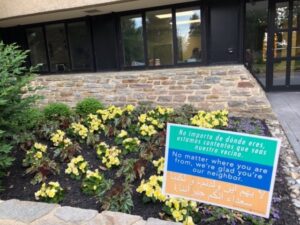
The political power of religious leaders should be harnessed for such purposes. Connecting together among religious groups for teaching universal inner peace practices and identifying leaders within those religious communities to network and take action together before and after major events occur (unfortunately, in many cases, tragedies) will strengthen the power of a multi-religious vision of positive peace. “Organized religion” can be a force for social justice and peace in this way. History has repeatedly proven that religious groups can not only help, but lead the way to address societal concerns and be extremely effective. Examples include the various groups that came together during the height of the Civil Rights Movement to work together to train teams and deescalate conflict, and faith-based work on economic development including the Poor People’s Campaign. The same can and should be done now in this fractious political climate where divided sides yell at each other, but never bother to listen to each other. Constructive conflict can be healthy and even help us grow, with the power of love in action. Isn’t that what Zoroastrianism (and indeed all religions) teach us in some form? But, as the collective group recognized, it is not enough to just say the words. It must also be practiced, in action, as Zoroastrianism decrees. Because what benefit is good thoughts or good words without the good deeds? The group discussion emphasized that religious leaders must not only teach the sermons and engage in education, but practice what they preach.
When discussing the topic of protecting the Earth, someone from the Muslim faith remarked, “taking care of the environment is the service to God.” This is clearly a basic Zoroastrian tenet I’ve known since a young girl at religious class, learning about the traditional Tower of Silence to prevent pollution of the Earth. While my young, American mind initially thought the practice “disgusting,” with time I matured to understand it was the best way to dispose of the dead and prevent disease while also taking care of the Earth at the same time. Zoroastrianism taught this duty long ago before recognition of climate change that we are the stewardship of nature to exist peacefully on Mother Earth.
And where the religious leadership does not specifically include women as priests, ministers, etc., it is imperative that the voices of women and the youth are engaged as stakeholders with equal access at the table. We must ensure that religious structures include the many voices and this may require redefining the paradigm of power. We must amplify interfaith leadership to resolve the urgent issues society is facing, educate others and join forces in collaboration, speaking with one voice and heart for the good of all to achieve the justice, wisdom, truth, righteousness, purity, Vohu Manah and devotion that Zarathustra spoke of to achieve our eternal progress.
It was an honor and privilege to attend this wonderful conference to discuss such important and challenging issues with members of the interfaith community and have Zoroastrianism’s key principles represented in tackling these topics. It strengthened my faith by demonstrating the relevance of Zarathustra’s guiding principles and message.
[by Ms. Spenta Cama]
%MCEPASTEBIN%

